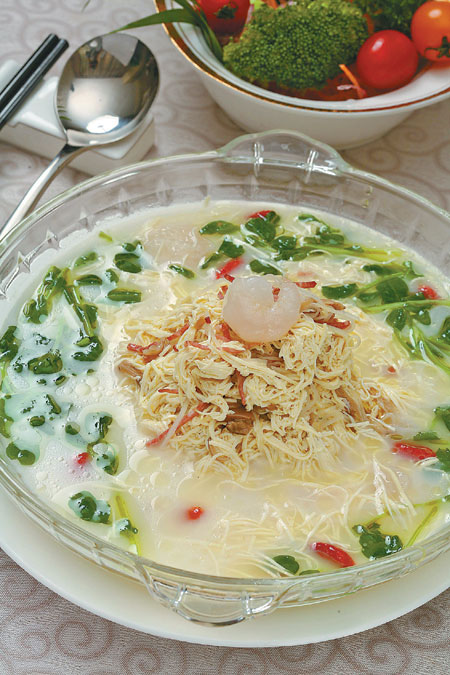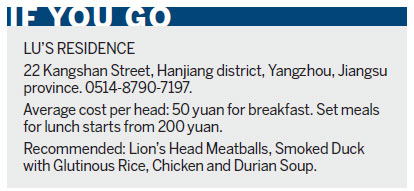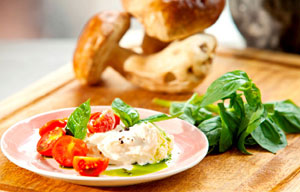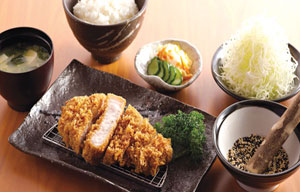Legacy of the salt merchants
Updated: 2013-04-02 09:00
By Xu Junqian (China Daily)
|
|||||||||||
 |
|
Braised gansi is a signature Huaiyang dish. [Photo/China Daily] |

Our trip to Yangzhou was to come to a finale with a dinner at the century-old former residence of one of the richest salt merchants in the Qing Dynasty (1644-1911). When I told my friend that, the text reply, which came back immediately, was: "Is it going to be salty?"
That was a joke, of course, but in spring, the old mansion is majestic, the largest of its kind. You would think that the owner hardly needed to depend on food to attract customers.
But I was proved wrong.
Entering the heavily-walled residence restaurant, we walked down a long corridor festooned with red lanterns and climbed a creaking wooden staircase to the bedroom of one of the daughters of the salt merchant. The chamber is one among a hundred rooms that now accommodate private dining.
We were seated and immediately served with a warm cup of tea and half of a double-yolked century egg dressed with vinegar. It was a refreshing start.
The reservation-only restaurant provides no a la carte menu, and set meals starts from 200 yuan ($32) per head, with 11 courses. We chose the 300-yuan set, a modest selection, and were very pleased with what came to the table.
Aside from the signature Huaiyang dishes such as lion's head pork and crab meatballs and braised gansi, shredded dried tofu gently simmered in chicken soup, you must also order the glutinous rice topped with smoked duck.
The crisp duck skin that tops the bar of pressed glutinous rice is a marvel of contrast in texture and taste. The rice is flavored by the meat juices and the whole is just delicious.
This is springtime, and the fresh river harvest is in season. In one of 11 courses, we were served with a variety of shrimps, fish or crabs caught from the Yangtze River, including farm-raised puffer fish.
The essence of the fish is in its thick, rough skin which comes smothered in a rich, red sauce. The skin is rich as lard and the meat tender as spring chicken. Although certain parts of the wild puffer are poisonous, an expert chef reduces the risk. What was on our table, however, was the detoxified farm variety.
One surprise, for me, was the chicken soup cooked with durian. I am not a member of the anti-durian lobby, but the pungency of the fruit does get in the way of my enthusiasm. But, a spoonful of the soup served in a fine, white china tea cup changed my mind. It was good, and the strong aroma of the durian somehow made the chicken soup titillatingly sweet. According to the chef, durian functions like ginger, cutting through the grease of the chicken.
Sadly, the Yangzhou fried rice included in every set meal was a blemish on an otherwise perfect meal, perhaps because it is not even an original dish of the city. Ours was too damp, and bland.
Another tip: Do not order the nut juices if you want to leave room for food. It tastes good but also fills you up quickly, leaving space for little else.
xujunqian@chinadaily.com.cn
Related Stories
Eat like a local: Yangzhou 2012-09-29 12:42
Healthy huaiyang 2012-10-22 10:58
Cooking skill exchange activity launched in Zhenjiang, China's Jiangsu 2012-12-17 11:55
International Best Cook Contest in Jiangsu 2012-05-31 18:13
Today's Top News
Police continue manhunt for 2nd bombing suspect
H7N9 flu transmission studied
8% growth predicted for Q2
Nuke reactor gets foreign contract
First couple on Time's list of most influential
'Green' awareness levels drop in Beijing
Palace Museum spruces up
Trading channels 'need to broaden'
Hot Topics
Lunar probe , China growth forecasts, Emission rules get tougher, China seen through 'colored lens', International board,
Editor's Picks

|

|

|

|

|

|







